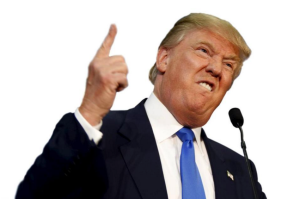 Donald Trump and Hillary Clinton are now pretty assured of winning their party’s nomination for president, both because they are far ahead and because it seems unlikely either will implode with their respective bases. They have both had fundamental vulnerabilities exposed, yet they both continue to have a sufficient amount of support to win their nominations.
Donald Trump and Hillary Clinton are now pretty assured of winning their party’s nomination for president, both because they are far ahead and because it seems unlikely either will implode with their respective bases. They have both had fundamental vulnerabilities exposed, yet they both continue to have a sufficient amount of support to win their nominations.
As the campaigns shift to the general election, Team Clinton shouldn’t take Donald Trump lightly, says the boy who watched slack jawed as a sophomoric but entertaining professional wrestler with no real policy agenda became Governor of Minnesota. The Trump-Ventura parallels are imperfect. For instance, the Minnesota electorate in 1998 was divided by three strong general election contenders, making the general election threshold unusually low for the middle finger voting block to attain. Still, that experience has given me a healthy amount of respect for the electoral appeal of entertaining protest candidates.
But to put this in casino terms, in honor of the candidate who somehow finds ways to regularly bankrupt rigged casinos, I’d much rather have Hillary Clinton’s hand than Donald Trump’s hand. Here’s why:
As pundits continually remind us, Trump is indeed the runaway Republican front-runner. But this doesn’t mean he is broadly popular. All this really means is that his antics have charmed about 40% of the one-third of Americans who participate in Republican primaries. That equates to about 14% of the general election electorate. So, yes, he’s the front-runner for the nomination, and that’s a shocking thing. But we have to keep in mind that eight months from now, he needs to win over a lot more people to win a general election.
The problem for Trump is, general election voters are a very different audience than the people currently voting for him. Most notably, they include large numbers of Independent voters. To win a two-candidate — don’t you even think about it, Michael Bloomberg — general election Trump has to win Independent voters.
What do Independent voters think of Trump’s nomination campaign performance. As of December 2015 poll showed 47% of Independent voters would be embarrassed to have Mr. Trump as President. Only 20% of Independents would be proud to say “President Trump.” Even pilloried Hillary, one of the more systematically smeared political figures in modern political history, has a much lower 32% of Independents who say they’d be embarrassed to vote for her.
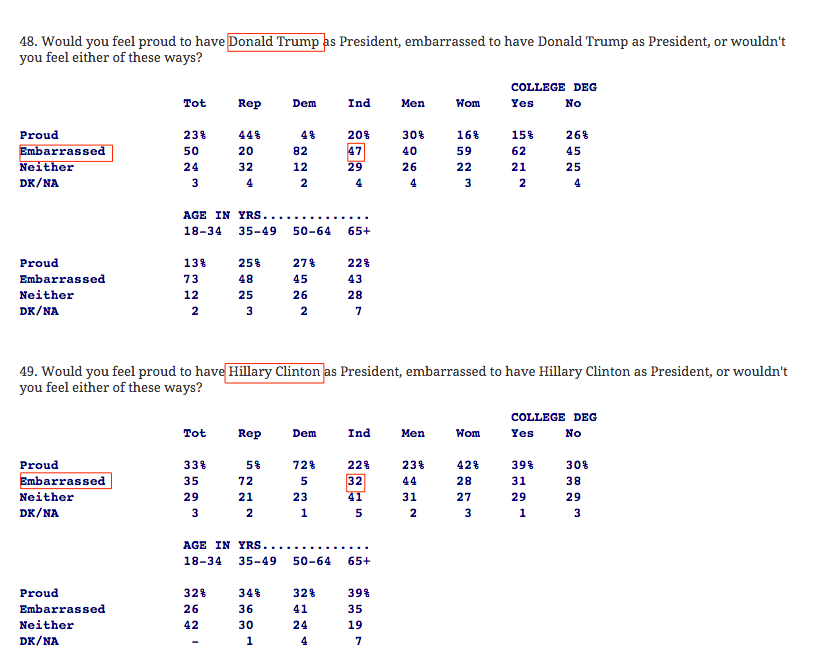
This is a big problem for Trump, because the “would be embarrassed” question is a reasonable approximation of “would never vote for.” Therefore, the finding shows that Trump’s pandering to his authoritarian-loving base has badly damaged his chances in a general election, perhaps irreparably so.
Now, if anyone is uniquely positioned to dig himself out of this hole, it may be Mr. Trump. First, he’s instinctively talented at reading audiences and adjusting to them on the fly. He’s like a veteran door-to-door salesman in that way. Second, he’s no ideologue. He’s perfectly comfortable changing positions to win over whichever audience happens to be in front of him at the moment, and skilled at deflecting “flip-flopper” criticisms. Therefore, as soon as the Republican nomination is in the bag, we can expect Trump to quickly be moderating his positions and tone, and that should help him partially rehabilitate himself with some Indies.
Still, it will be very difficult to erase the memories of Trump’s boorish behavior over the past several months. Social media and massive ad buys will keep Trump’s Greatest Hits fresh in general election voters’ minds. Moreover, over the next eight months Trump will still have his hard core Trumpeters coming to his rallies, which will continually tempt him to pander to them, both to win their adoration in that moment and to ensure that they don’t stay home in November. So, Trump will moderate compared to his current self, but he probably will remain plenty embarrassing.
These same numbers also show how critically important it will be for Hillary Clinton to partner with Bernie Sanders to get Sanders’ 18-34 year old supporters to the polls in November. After all, an astounding 73% of these younger voters would be embarrassed to have Trump as their President. This should be a solid voting block for Secretary Clinton in the general election, but they could easily stay home in large numbers if they can’t get more excited about her than they are now.
So as the nomination fights wind down, it’s time to stop obsessing about the nomination horse race numbers and delegate counts, and start focusing on the more general election-relevant data points in the survey research. When you dig a little bit deeper into the data, there still is a very high wall around the White House for the wall-obsessed Trump to scale.

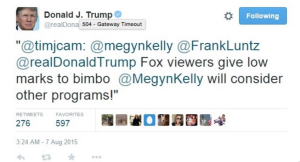 Maybe that’s because reporters are worried bullying candidates will give them the Megyn Kelly Treatment/Rebecca Quick Treatment. Maybe it’s because reporters don’t take the time to learn policy issues. Maybe it’s because reporters don’t respect voters’ intelligence enough to think that they will care about, or understand, policy issues
Maybe that’s because reporters are worried bullying candidates will give them the Megyn Kelly Treatment/Rebecca Quick Treatment. Maybe it’s because reporters don’t take the time to learn policy issues. Maybe it’s because reporters don’t respect voters’ intelligence enough to think that they will care about, or understand, policy issues
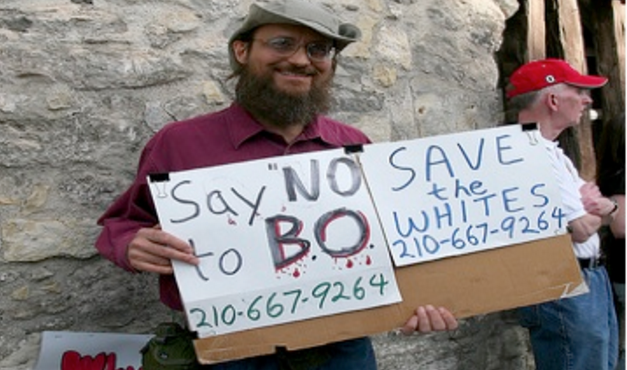 Mamas don’t let your babies grow up to be tea boys.
Mamas don’t let your babies grow up to be tea boys.
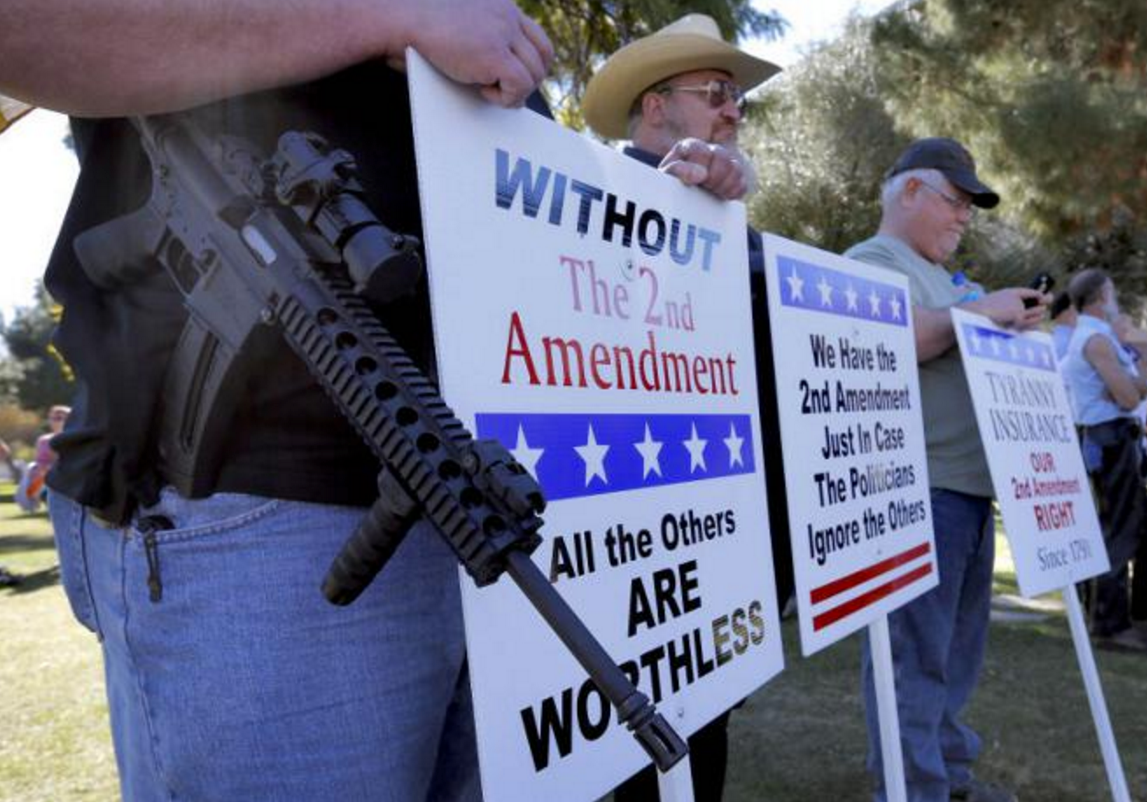 Mamas don’t let your babies grow up to be tea boys.
Mamas don’t let your babies grow up to be tea boys.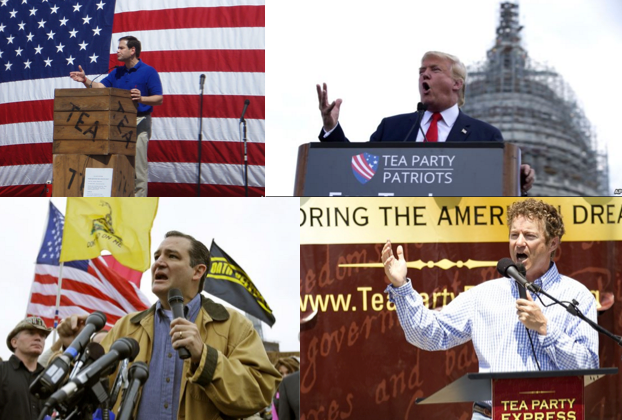
 Rubio ran for Senate in Florida as the candidate of the extremist Tea Party, not as the moderate alternative to the Tea Party.
Rubio ran for Senate in Florida as the candidate of the extremist Tea Party, not as the moderate alternative to the Tea Party.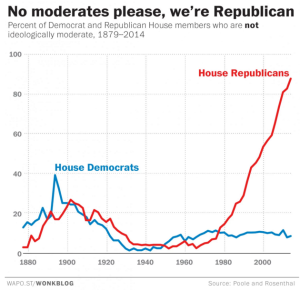 By any reasonable measure, Senator Rubio is a far-right extremist, as is Ohio Republican Governor John Kasich (88% lifetime ACU rating), who is also sometimes inaccurately labeled a moderate by simplistic pundits. Political scientists have
By any reasonable measure, Senator Rubio is a far-right extremist, as is Ohio Republican Governor John Kasich (88% lifetime ACU rating), who is also sometimes inaccurately labeled a moderate by simplistic pundits. Political scientists have  Watching the news coverage of the Republican presidential campaign, you get the feeling that there is a wave of support for the ideas of leading Republican candidates like Donald Trump, Ben Carson, Ted Cruz and Marco Rubio. For example,
Watching the news coverage of the Republican presidential campaign, you get the feeling that there is a wave of support for the ideas of leading Republican candidates like Donald Trump, Ben Carson, Ted Cruz and Marco Rubio. For example, 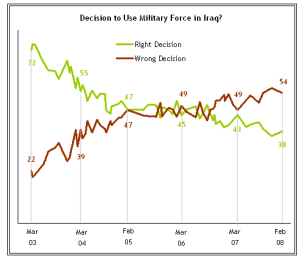 In other words, the national mood is much like when America rushed into the Iraq War in 2003.
In other words, the national mood is much like when America rushed into the Iraq War in 2003. 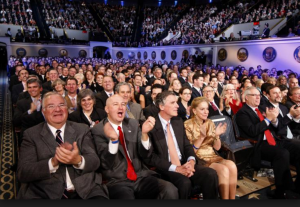 If I were a political party chair, I would make one simple adjustment to make my party more competitive. I would only allow general election swing voters to attend candidate debates.
If I were a political party chair, I would make one simple adjustment to make my party more competitive. I would only allow general election swing voters to attend candidate debates.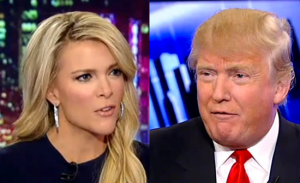 So, Donald Trump
So, Donald Trump 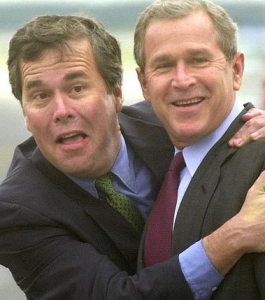 Prior to the Trump surge, Jeb Bush was being compared to his brother former-President George W. Bush, and he wasn’t managing that comparison well. He was
Prior to the Trump surge, Jeb Bush was being compared to his brother former-President George W. Bush, and he wasn’t managing that comparison well. He was 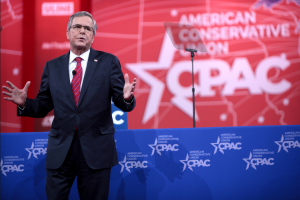 This is hardly a Republican “moderate” in the tradition of other Republican Presidents, such as Theodore Roosevelt, who was pro-union and anti-corporate monopoly, Dwight Eisenhower, who spent heavily on government-funded infrastructure and warned us about the military-industrial complex, or Richard Nixon, who created the Environmental Protection Agency and worked with Teddy Kennedy on a more generous version of Obamacare. Those are Republican moderates, not Jeb Bush.
This is hardly a Republican “moderate” in the tradition of other Republican Presidents, such as Theodore Roosevelt, who was pro-union and anti-corporate monopoly, Dwight Eisenhower, who spent heavily on government-funded infrastructure and warned us about the military-industrial complex, or Richard Nixon, who created the Environmental Protection Agency and worked with Teddy Kennedy on a more generous version of Obamacare. Those are Republican moderates, not Jeb Bush.